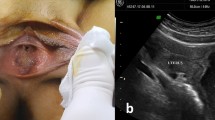Abstract
Purpose
To study the efficacy and safety of uterine artery embolization in treatment of obstetric hemorrhage.
Methods
This ethically approved prospective study was conducted between November 2017 and October 2019, and written informed consent was obtained from all patients. Consecutive patients presenting with uncontrolled obstetric hemorrhage were evaluated. Fifty-three patients with uncontrolled bleeding underwent uterine artery embolization (UAE) and were followed up.
Results
Spectrum of patients encountered in this study was arteriovenous malformations (AVMs) (n = 25), retained products of conception (RPOC) (n = 16), RPOC with secondary AVMs (n = 5), ectopic pregnancy (n = 5) and iatrogenic trauma to cervix or vagina (n = 2). A total of 57 UAE procedures were performed in these 53 patients as repeat sessions were required in four patients. Most common embolic agent used was polyvinyl alcohol (PVA) particles with gelfoam followed by cyanoacrylate glue as second most common agent. Technical success was achieved in 57 (100%) of 57 UAE procedures. Primary clinical success was achieved in 49 (92%) of 53 patients and secondary clinical success in 52 (98%) patients. Clinical failure was observed in one patient who underwent hysterectomy.
Conclusion
Uterine artery embolization is a safe and effective procedure in the management of uncontrolled obstetric hemorrhage.


Similar content being viewed by others
References
World Health Organization. WHO recommendations for the prevention and treatment of postpartum haemorrhage. [Internet]. 2012 [cited 2019 Oct 15]. http://www.myilibrary.com?id=1003393
Vogel JP, Oladapo OT, Dowswell T, Gülmezoglu AM. Updated WHO recommendation on intravenous tranexamic acid for the treatment of post-partum haemorrhage. Lancet Glob Health. 2018;6(1):e18–9.
Themes UFO. Management of Obstetric Hemorrhage [Internet]. Anesthesia Key. 2017 [cited 2019 Oct 15]. https://aneskey.com/management-of-obstetric-hemorrhage/
Masip JM, Toledano LA, FerreroMartínez S, Roig MDG. Massive Postpartum Hemorrhage: Protocol and Red Code. Obstetrics [Internet]. 2017 Dec 20 [cited 2019 Oct 15]; https://www.intechopen.com/books/obstetrics/massive-postpartum-hemorrhage-protocol-and-red-code
Soyer P, Morel O, Fargeaudou Y, Sirol M, Staub F, Boudiaf M, et al. Value of pelvic embolization in the management of severe postpartum hemorrhage due to placenta accreta, increta or percreta. Eur J Radiol. 2011;80(3):729–35.
Ohmaru-Nakanishi T, Kuramoto K, Maehara M, Takeuchi R, Oishi H, Ueoka Y. Complications and reproductive outcome after uterine artery embolization for retained products of conception. J Obstet Gynaecol Res. 2019;45(10):2007–14.
Khalilzadeh O, Baerlocher MO, Shyn PB, Connolly BL, Devane AM, Morris CS, et al. Proposal of a new adverse event classification by the society of interventional radiology standards of practice committee. J Vasc Interv Radiol. 2017;28(10):1432-1437.e3.
Song Y, Shin JH, Yoon H-K, Kim JW, Ko G-Y, Won H-S. Bleeding after dilatation and curettage: the efficacy of transcatheter uterine artery embolisation. Clin Radiol. 2015;70(12):1388–92.
Lee HY, Shin JH, Kim J, Yoon H-K, Ko G-Y, Won H-S, et al. Primary postpartum hemorrhage: outcome of pelvic arterial embolization in 251 patients at a single institution. Radiology. 2012;264(3):903–9.
Aas-Eng MK, Qvigstad E, Kløw N-E, Hald K. The impact of uterine artery embolization to reduce postpartum hysterectomy. Gynecol Surg. 2016;13(3):153–8.
Ganguli S, Stecker MS, Pyne D, Baum RA, Fan C-M. Uterine artery embolization in the treatment of postpartum uterine hemorrhage. J Vasc Interv Radiol. 2011;22(2):169–76.
Author information
Authors and Affiliations
Corresponding author
Ethics declarations
Conflict of interest
The authors declare that they have no conflict of interest.
Research involving Human Participants and/or Animals
This study was performed in line with the principles of the Declaration of Helsinki. Ethics approval was obtained from the Institute Ethics Committee of All India Institute of Medical Sciences, New Delhi vide Ref No. IECPG-468/29.11.2017. Informed consent from the patient was taken for both the procedure and for possible publication.
Informed Consent
Informed consent from the patient was taken for both the procedure and for possible publication.
Additional information
Publisher's Note
Springer Nature remains neutral with regard to jurisdictional claims in published maps and institutional affiliations.
Dr. Mohit Gambhir, M.D. is a first year Senior Resident in the Department of Radiodiagnosis at All India Institute of Medical Sciences, New Delhi, India. Dr. Shivanand Gamanagatti is M.D. and Professor at Department of Radiodiagnosis at All India Institute of Medical Sciences, New Delhi, India. Dr. Raju Sharma is M.D. at Department of Radiodiagnosis at All India Institute of Medical Sciences, New Delhi, India. Dr. Smita Manchanda is M.D. at Department of Radiodiagnosis at All India Institute of Medical Sciences, New Delhi, India. Dr. Naren Hemachandran is M.D. at Department of Radiodiagnosis at All India Institute of Medical Sciences, New Delhi, India. Dr. Alka Kriplani is M.D. at Department of Radiodiagnosis at All India Institute of Medical Sciences, New Delhi, India. Dr. Vatsla Dadhwal is M.D. at Department of Radiodiagnosis at All India Institute of Medical Sciences, New Delhi, India. Dr. Neena Malhotra is M.D. at Department of Radiodiagnosis at All India Institute of Medical Sciences, New Delhi, India. Dr. J. B. Sharma is M.D. at Department of Radiodiagnosis at All India Institute of Medical Sciences, New Delhi, India.
Rights and permissions
About this article
Cite this article
Gambhir, M., Gamanagatti, S., Sharma, R. et al. Uterine artery Embolization: Interventional Radiologist's Perspective in Management of Uncontrolled Obstetric Hemorrhage. J Obstet Gynecol India 72 (Suppl 1), 126–133 (2022). https://doi.org/10.1007/s13224-021-01567-x
Received:
Accepted:
Published:
Issue Date:
DOI: https://doi.org/10.1007/s13224-021-01567-x




